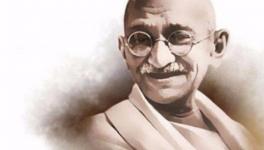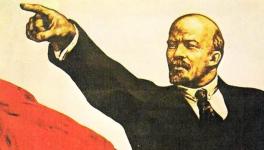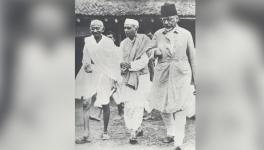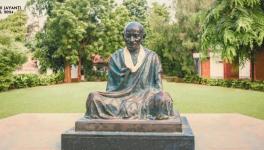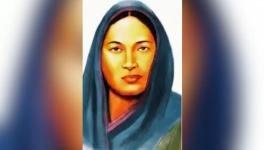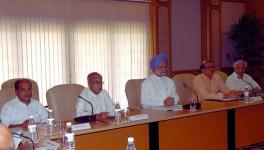Godse, a Third Wheel in Gandhi-Ambedkar Ties
As the eminent historian Eric Hobsbawm has said, every nationalism constructs its own history. “History is to Nationalism what poppy is to an opium addict,” is his exact formulation. One can add that every nationalism constructs its own heroes—in accordance with its ideology. In order to create their heroes, they also have to undermine those who stood against the path its “heroes” took.
This exercise requires two complementary manoeuvres: one to uphold the heroes it wants to promote and the other to throw negative light on opposing leaders. This is precisely what is happening in India at present. The glorification of the right-wing icon Nathuram Godse is taking place on the one hand while on the other Mahatma Gandhi is being shown in a negative light.
There have been regular demands to build temples for Godse, and his name is also being adorned with honorable prefixes, but he is not alone. Malegaon bombing accused Pragya Thakur, now a Member of Parliament, has been claiming that Godse ‘was, is and will remain’ a patriot. A portrait of Godse’s guru and mentor, the founder of Hindutva Vinayak Damodar Savarkar, already hangs in the Lok Sabha. Now there are demands to confer the Bharat Ratna, India’s highest civilian honour, on him.
Congress party leader Rahul Gandhi correctly said recently that praising Godse is a perfect representation of the Bharatiya Janata Party’s “hate politics”.
In the effort to present Gandhi, who was assassinated by Godse, in negative light, the very fact of this murder is being erased. It is missing in most books already, and lately, efforts have picked up to spread the canard that Gandhi had committed suicide. This reflected as a question in the Class 9 examinations held in Gujarat recently: ‘How did Gandhi commit suicide?’. So far, it has been thoroughly propagated that Gandhi was killed for “appeasing” Muslims, that it was due to him that the Partition took place, and that he was responsible for giving Rs 55 crore to Pakistan, that he was anti-Hindu and so on.
The newly-minted MP, Pragya, after referring to Godse as a patriot, then apologised to save face for her party, which gave her the ticket to contest from Madhya Pradesh’s Bhopal constituency. At the same time, to undermine Gandhi, Ambedkar’s critique of him is being circulated furiously on social media. Select remarks by Ambedkar, in which he is critical of Gandhi, are being put across in WhatsApp groups.
All this rigmarole, the multidimensional efforts, are aimed to glorify Godse and justify his assassination of Gandhi. But who was Godse? He began his political career as a RSS or Rashtriya Swayamsevak Sangh pracharak and later joined the Hindu Mahasabha under the leadership of Savarkar.
The attempt by Hindutva elements is not to elaborate on Gandhi’s views fully but to nitpick. They wish to exaggerate the differences that may have existed between Gandhi and other national icons, in order to paint him in a bad light. Of late, the Poona Pact has become the key issue around which Gandhi is being shown as “against” Ambedkar. This pact was signed by the two leaders, but they did not agree on its terms—which were about the political and social future of the depressed classes.
Yes Gandhi and Ambedkar disagreed, but their disagreement was at the level of strategy. For instance, Gandhi believed that a “separate electorate” would undermine the unity of the anti-colonial struggle in India. He emphasised on ending untouchability and pursued the idea of reserved constituencies as a way to enshrine reservations in the constitutional scheme of things. Gandhi, as leader of the anti-colonial movement, believed he had to take along all Indians, irrespective of their diverse identities.
He was also particular about the means to achieve this goal of Independence. It is due to this that despite his regard for Bhagat Singh and his comrades, he did not pursue the case for his pardon beyond a point. Of course Bhagat Singh, the great nationalist did not want pardon for principled reasons.
India’s freedom movement was based on democratic principles. It is Gandhi who turned the anti-colonial movement into a powerful mass movement. After a point, the Congress party chose the path that did not match exactly with Gandhi’s strategy. Closer to Independence, within the Congress, it was Jawaharlal Nehru and Sardar Patel, and other major leaders, who had to take decisions—and not all were to the liking of Gandhi. For instance, Gandhi could neither accept Partition nor agreed with the economic policies the others favoured. Although Gandhi had the highest moral authority, Nehru and Patel, who were his disciples, adopted strategies that differed from his. Once Gandhi complained: “My voice carries no weight in the [Congress] Working Committee. I don’t like the shape things are taking and I cannot speak out.”
Seen in this light, even the Ambedkar-Gandhi relationship is more nuanced. Gandhi was the tallest figure in the freedom movement, but no dictator. Thus, history is testament to the fact that there were far more agreements than disagreements even between these two leaders. Both were on the same side of deeper issues such as the basic guiding principles of democracy, the concepts of liberty, equality and fraternity, and much more.
To prove Godse right, posthumously and belatedly, will take more than some quotes from dissenting voices, circulated to exaggerate their differences. Differences are the life-breath of a democracy and of democratic movements. The core point is that Godse-Savarkar & Company disagreed on the very concept of nationalism from Ambedkar, Gandhi, the Congress party and all other stalwarts of the freedom movement.
While Gandhi, Ambedkar, Nehru and Patel were dreaming of a nation which accepted diversity, which was inclusive and based on principals of equality, Savarkar-Godse and the other Hindu nationalists were—and still are—harping on a mythical golden past. The same past in which inequality was in-built and based on birth. The Hindu right is becoming more assertive and powerful by the day, but their ideas remain exclusive, they are against other religions and they construct this ‘Otherness’ to impose their will on all who differ from them.
Pragya Thakur is what Hindu nationalists stand for, but they don’t want to bluntly articulate this yet. Through all their activities they want to subtly defend and then glorify the ideology which Godse represented.
Get the latest reports & analysis with people's perspective on Protests, movements & deep analytical videos, discussions of the current affairs in your Telegram app. Subscribe to NewsClick's Telegram channel & get Real-Time updates on stories, as they get published on our website.









